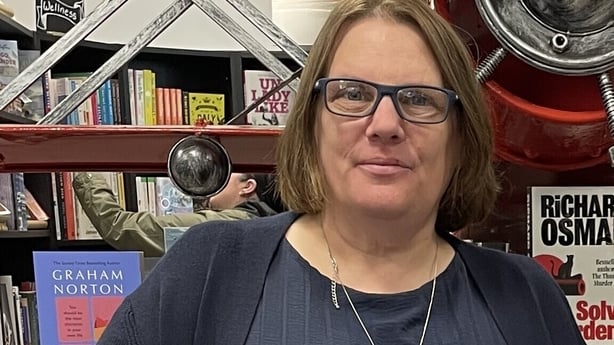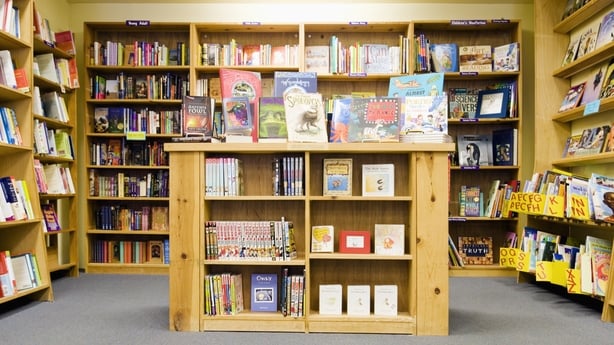A Co Louth bookshop owner has said the Government's introduction of free schoolbooks has been a "death knell" for independent bookshops across Ireland.
Irene Gahan, owner of Academy Bookstore in Drogheda, has closed her shop and largely attributes the downturn in her business to the Free Books Scheme.
She described the decision to shut as "heartbreaking".
Ms Gahan said the trade from schoolbooks and the associated footfall made up 45-50% of her turnover. She said the scheme may be positive for parents but it has had devastating consequences for booksellers.
Since September 2023, parents of children in primary school and special schools do not have to pay for schoolbooks, workbooks or copybooks. The school provides free books on loan.
The scheme was extended to Junior Cycle students last September and will extend to students in transition year, fifth year and sixth year from September 2025.
While Ms Gahan acknowledged the current challenging environment in the retail sector, she said her business would still be open were it not for the scheme. She believes schools are now sourcing books from larger retailers and publishers who can offer bigger discounts, and smaller shops are not in a position to compete.
"The issue was the footfall had dropped," she explained.
"Parents weren't now coming in with their children during the summer, they weren't putting their book lists in, buying their schoolbooks and their stationery, but also the knock-on. Children's books weren't being bought either and that had a knock-on effect across the board.
"The fabric of Ireland was always built on the basis of small butchers, the baker, and a bookshop. They're what makes the fabric of a town. Take them out of an environment and you're just left with the bigger brands, the bigger outlets and the bigger stores.
"You're losing an identity. You're losing a community."

Bookselling Ireland, the trade body for book retailers, said ten bookshops closed in Ireland in 2024, although one new store opened.
Chairperson Dawn Behan said the scheme is a great idea in principle as it reduces the financial burden on parents, but the implementation of the scheme has "adversely affected bookshops in a massive way" and "changed the landscape of bookselling".
A survey carried out by Bookselling Ireland after the initial rollout of the scheme in 2023 found that 49% of bookshops sold schoolbooks in some form.
Ms Behan said the Department of Education had consulted Bookselling Ireland since the beginning of the scheme, but she believes there was no proper understanding of the consequences for smaller retailers.
She said bookshops are now closing "in droves".
"It's gone too far I think at this stage, so I'm not really sure how we can pull it back. All we can do is continue to highlight what bookshops offer to their communities and to their local towns that isn't offered by anybody else."
Read More:
Schoolbook sellers raise concerns over free book scheme
SVP calls for expansion of free schoolbooks scheme
Ms Behan added that the vast majority of their members support local authors and arts festivals, hold book clubs and schools' events, and the closure of those shops will impact the wider cultural ecosystem.
"We're providing a lot of cultural and social capital to local towns and villages, and if that's gone, that's it," she said.
"It'll be gone and it's very difficult to get that kind of commitment and that kind of cultural appetite back."
A spokesperson for the Department of Education said it has been engaging with Bookselling Ireland for the past two years and will continue this collaboration.
"Please note that schools that receive public funding must follow EU and national procurement rules when purchasing goods and services, and the department provides various supports to help schools meet these requirements.
"For schoolbook contracts and for classroom resources contracts under €50,000, excluding VAT, schools can seek three written quotes from suppliers of their choice."

Carlow Educate Together National School principal Simon Lewis said his school had a "great" relationship with a local bookshop, but changed supplier after seeking three quotes when the scheme was introduced.
"As lovely as the saving is for parents, there is a negative impact for small businesses as well as writers, publishers, and people like that," he said.
"And I'm not sure, have we done a disservice? The unintended consequences of it, have we done a disservice to people like that?"
The Association of Community and Comprehensive Schools is the national representative association for 97 post-primary schools across the country, and is involved in national decision-making. It said the free book scheme has been "widely welcomed as a positive development for students and families".
It said schools and book suppliers engage with a "dynamic procurement system".
"A key element of this procurement system will be an emphasis on the ability of any book supplier to become part of the system," the association said.
"In order to ensure this, the procurement process will be divided into different competitions so as to make the process fair to all book suppliers and any particular supplier will be limited in the number of areas they can apply for.
"This should help provide an opportunity for small and local book suppliers to be fully involved in the provision of books and materials for their local schools. It should also be noted that last year many schools worked closely with local providers through the procurement scheme to provide materials.
"It is hoped that the book scheme with the new procurement process being rolled out for the next school year will provide many opportunities for local book shops and suppliers."
We need your consent to load this rte-player contentWe use rte-player to manage extra content that can set cookies on your device and collect data about your activity. Please review their details and accept them to load the content.Manage Preferences







